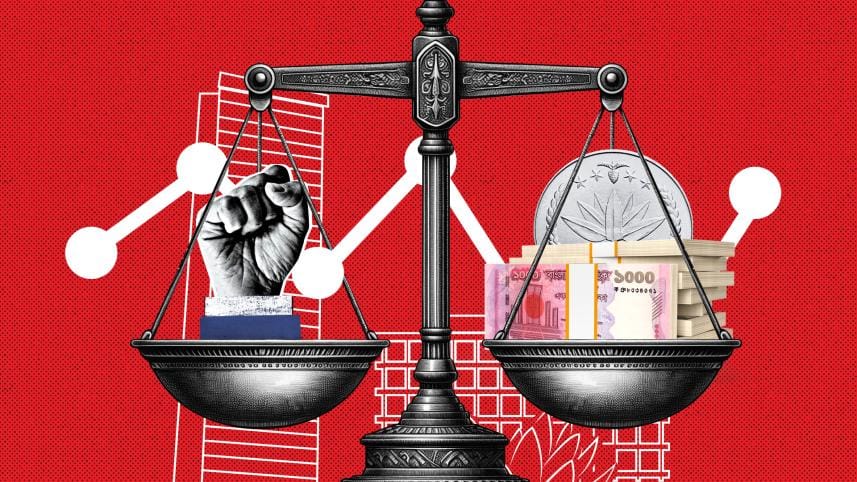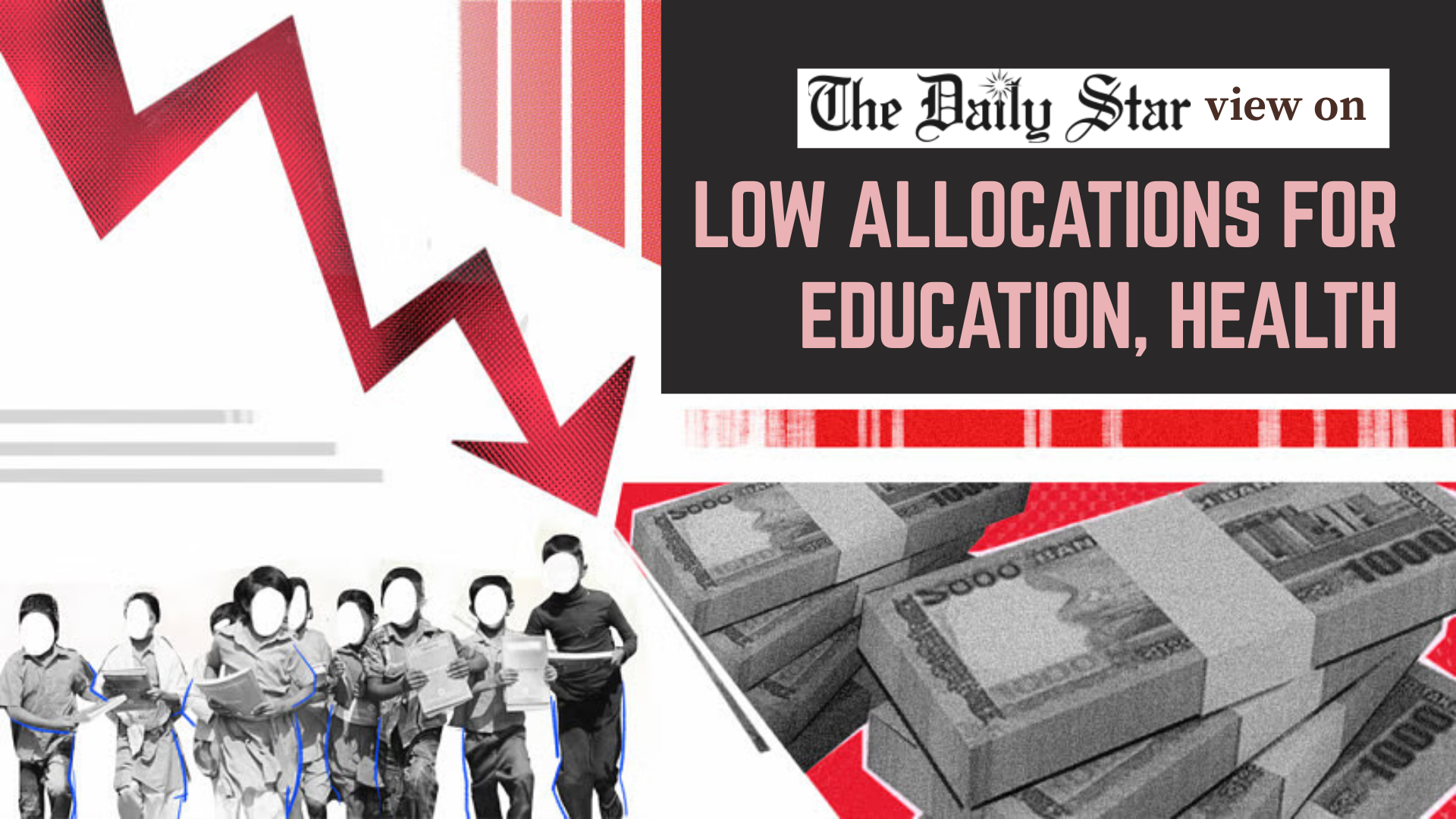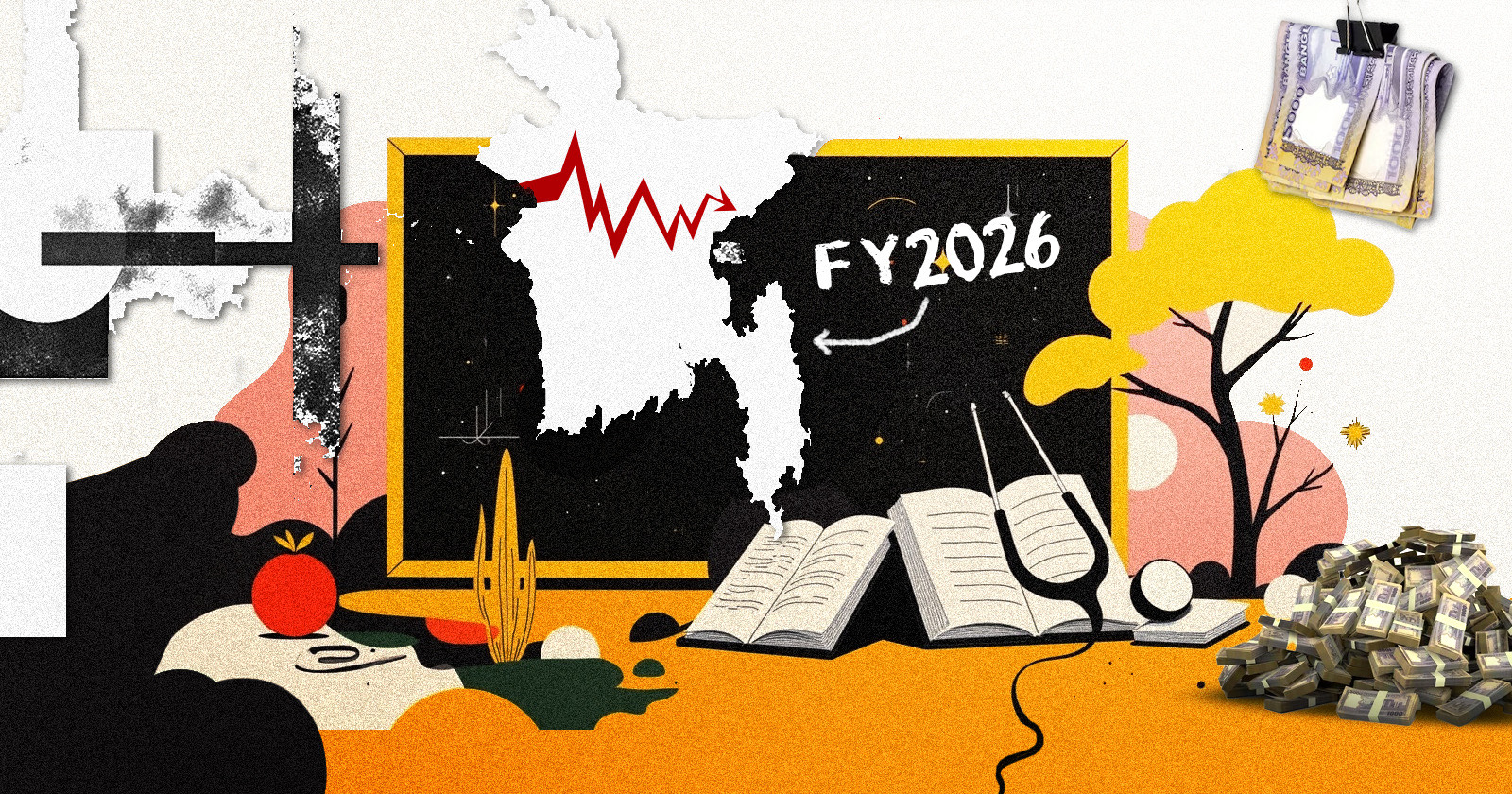The budget was a missed chance to honour the revolution

This year's national budget was presented not merely at the end of a fiscal cycle, but at the end of an era—one marked by systemic corruption, institutional degradation, and a profound alienation of citizens from their state. That this interim government had to prepare the budget within the skeletal framework left behind by the fallen regime is not in question. Nor is it fair to ignore the administrative and financial constraints they inherited. But while constraints explain limitations, they do not absolve responsibility. This budget was a historic opportunity to redefine the role of the state, to mark a definitive departure from the logic of managed inequality and patronage. It did not take that opportunity.
Instead, the budget stays within the grooves of a model we have already rejected. It repeats the structural imbalance that has long tilted our economy away from justice. It does not lay the foundation for an economic settlement that would decisively confront the legacy of discrimination, exclusion, and economic concentration by the elites.
The central failure is not one of omission but of orientation. The budget keeps intact the asymmetry between direct and indirect taxation. The wealthiest citizens, those with the means to conceal income and relocate capital, remain under-regulated. It is a missed opportunity to introduce new instruments or institutional strategies to identify and tax high-net-worth individuals or large corporate actors. A more progressive tax policy could also alleviate the burden on the middle class and ensure that those with the broadest shoulders carry a greater share of the responsibility. In contrast, VAT and other regressive levies remain the primary engines of revenue. It is a choice that perpetuates the transfer of burden from the powerful to the vulnerable. Meanwhile, taking loans to mitigate the deficit harms investment and employment in the private sector, and 15 percent of the budget is allocated for interest payments. Yet, we see no comprehensive plan to move away from this cycle.
We recognise that revolutionary change requires adequate revenue. But the proposed budget fails to present a clear and equitable strategy for mobilising it. While automation and administrative reforms at the National Board of Revenue (NBR) are welcome, the budget stops short of serious reform. It lacks concrete measures to tackle tax evasion, broaden the tax base, and improve compliance. Performance-based incentives for NBR staff, expansion of personal income tax coverage, and increased taxation on property and assets are critical steps that remain unaddressed. The budget also lacks a clear timeline or benchmarks for phasing out opaque tax exemptions for the privileged class. This is not a technical issue. It is a question of political will and of whom the state is ultimately accountable to.
The same misalignment is visible in the area of employment. The budget contains no coherent national employment strategy, no public works programme, no jobs guarantee, and no shift towards labour-intensive infrastructure development. This could have been an opportunity to introduce a national minimum wage for people in precarious work, such as day labourers, transport workers, sales staff, and part-timers. The scattered measures for youth loans, freelancing, and training are not wrong in themselves, but they are no substitute for structural planning. A budget is not a collection of gestures. It is a statement of direction. And this one shows no vision when it comes to the country's largest crisis.
Allocations for health, education, and science and technology have increased ever so slightly. These are numerical adjustments within inherited systems, not transformative moves. The health system still remains urban-centric and underfunded in community-level care. The education system lags far behind global competition and remains without a vision for transformation. And the science and technology programmes remain concentrated in a few institutions, detached from a national innovation ecosystem. A revolutionary moment demands transformation, not an incremental shift.
One of the clearest examples of the budget's failure to break with the old order is in agriculture. Although headline figures on fertiliser subsidies, cold-storage concessions, and mechanisation incentives provide the appearance of support, these measures do little to transform the lives of marginal farmers. There is no plan for land-tenure reform or tenant protections, even though 40 percent of farm households are "pure" tenants; these cultivators cannot secure formal credit or move into nonfarm employment to diversify incomes. The continued emphasis on blanket subsidies, rather than targeted credit or loss-buffer schemes, benefits larger landholders who already access informal loans, while smallholders still struggle to finance their operations. Likewise, heralding Tk 6,333 crore for the Ministry of Agriculture without dedicated funding for extension services or climate-adaptive research is little more than a numeric tweak. Farmers still lack up-to-date agronomic advice, resilient seed varieties, and support against increasingly frequent floods. By offering handouts in place of reform—no procurement of diverse local crops, no investment in seed-sector oversight, no gender-responsive policies for women's access to land and credit—the budget reinforces inequality rather than making agriculture a genuine engine of rural prosperity.
Alongside farmers and small producers, another pillar of our economy, migrant workers, remains structurally overlooked. Every year, our workers remit billions, often at great personal cost. But a state that benefits from their labour abroad continues to neglect their rights at home. There is still no coordinated plan to train outgoing workers in higher-value skills, nor a serious reintegration effort through employment or entrepreneurship. Diversifying the labour force requires preparation, such as language instruction, sector-specific training, and legal support abroad. None of this was prioritised. And so, the country remains content to export vulnerability rather than skill.
A similar stagnation marks the treatment of small and medium enterprises. SMEs are widely acknowledged as the backbone of the economy. But there is no targeted credit guarantee mechanism, no robust infrastructure to integrate women-led or rural SMEs into the national economy. To make matters worse, the government has proposed tripling the VAT on online product sales commissions, from 5 percent to 15 percent. This single policy will disproportionately impact exactly the kinds of digital micro-entrepreneurs the state claims to support.
Most troubling of all is the continuation of the provision for whitening black money. We have seen, repeatedly, that such measures neither curb corruption nor generate sustainable revenue. They reward evasion and insult compliance. When a government invites money launderers to return with impunity, it sends a message that integrity is negotiable. We have reached a point in our political transition where we must abandon the fiction that informal economic amnesties are necessary or effective.
On the question of gender justice, the budget again stops short of structural intent. The increase in allowances for widows or stipends for girls' education is welcome. But these are not systemic answers. The structural exclusion of women from the formal economy, the absence of protections for care work, and the failure to address gendered insecurity in public space remain untouched. We cannot close the gender gap with minor transfers. We must redesign the system.
We welcome the government's allocation of Tk 405 crore for the July warriors and green initiatives. However, it is concerning that the budget lacks any specific measures to reduce non-performing loans or to support much-needed banking sector reforms through budgetary provisions.
The budget was an opportunity to express, through fiscal architecture, a break from the political and moral logic of the past. It could have been the moment that moved the country closer to a government that serves all, not just the organised, the connected, or the comfortable. That it did not do so is a missed opportunity. No revolution endures without reform. No reform endures without redistribution. And no redistribution is possible without the courage to change course.
The National Citizen Party remains committed to a vision of government that begins with recognising obligations to the young, the women, the working, the poor, the returning migrants, and the voiceless. It is only in fulfilling those obligations that we will honour the meaning of the revolution and build a Bangladesh that is for the many, not the few.
Nahid Islam is convenor of the National Citizen Party.
Khaled Saifullah is joint convener of the National Citizen Party.
The authors recognise the contributions of Ehtasham Haque, Islamul Haque, Istiak Akib, and Faisal Abdullah to this article.
Views expressed in this article are the author's own.
Follow The Daily Star Opinion on Facebook for the latest opinions, commentaries and analyses by experts and professionals. To contribute your article or letter to The Daily Star Opinion, see our guidelines for submission.





 For all latest news, follow The Daily Star's Google News channel.
For all latest news, follow The Daily Star's Google News channel. 


Comments